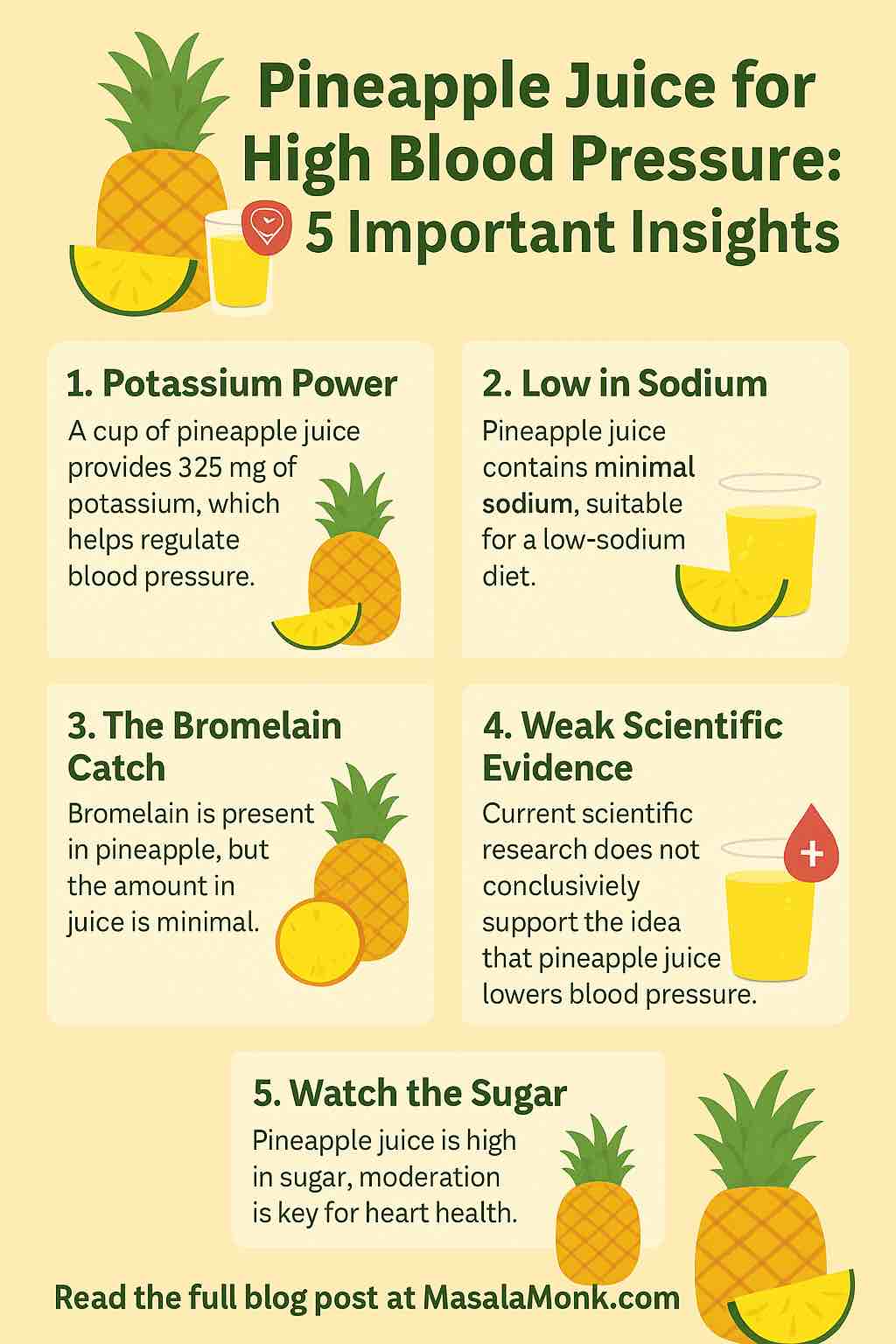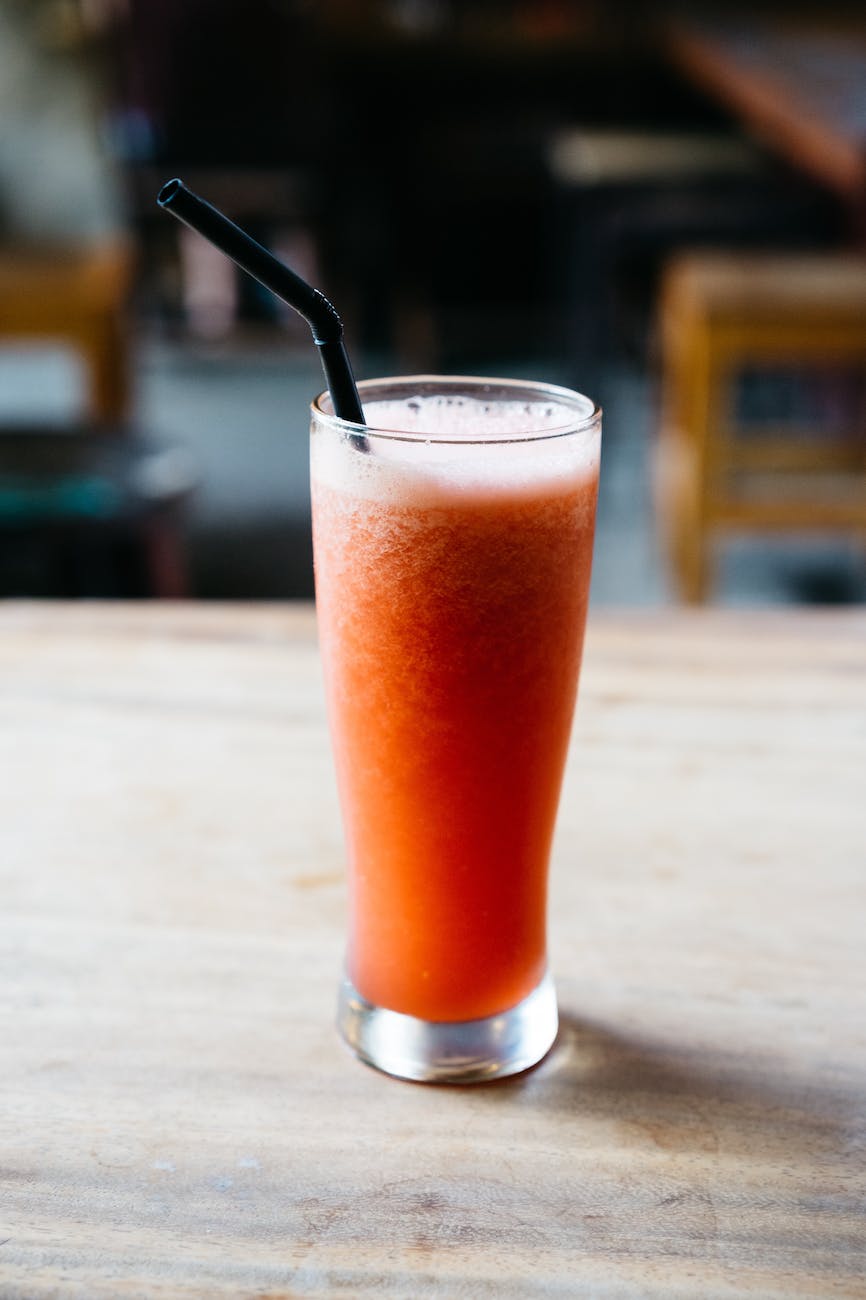
High blood pressure, or hypertension, affects over a billion people globally—and it’s not going away anytime soon. With the rise of natural wellness remedies, many are turning to everyday foods for solutions. One question comes up time and again: “Is pineapple juice good for high blood pressure?”
Let’s break down what science, nutrition, and experts say about this tropical drink’s role in cardiovascular health—without the myths, hype, or health guru nonsense.
1. Potassium Power: The Real Star in Pineapple Juice
Potassium is one of the most crucial minerals when it comes to managing high blood pressure. Why? Because it helps relax blood vessel walls and counters the effects of sodium—the primary villain in hypertension.
Pineapple juice contains a moderate amount of potassium. A cup of unsweetened juice offers roughly 325 milligrams, which contributes about 7% of your daily recommended intake.
What this means in practice:
- Potassium encourages smoother blood flow.
- It helps the kidneys flush out excess sodium, lowering overall pressure in the arteries.
- It supports heart rhythm regulation.
However, pineapple juice isn’t as potassium-rich as bananas, sweet potatoes, or avocados. If your goal is to manage high blood pressure through potassium, pineapple juice can support your intake, but it shouldn’t be your only source.
2. Low Sodium Content Makes It DASH-Diet Friendly
The DASH (Dietary Approaches to Stop Hypertension) diet is the gold standard for managing blood pressure. It emphasizes:
- Fruits and vegetables
- Whole grains
- Low sodium intake
- Foods rich in potassium, magnesium, and fiber
Pineapple juice—specifically unsweetened, 100% juice—checks several boxes here:
- It contains minimal sodium (under 5 mg per serving).
- It’s free of saturated fats and cholesterol.
- It offers natural hydration and antioxidants that can help reduce oxidative stress on blood vessels.
Still, it’s critical to read the label. Many store-bought pineapple juices are sweetened or blended with syrups, which can spike blood sugar and negate the benefits. Choose pure juice, or better yet, juice fresh pineapples at home for better control.
3. The Bromelain Debate: Promising, but Limited
Bromelain is an enzyme found in pineapple—particularly in the core—that’s received attention for its anti-inflammatory and anti-coagulant properties.
In lab settings and animal studies, bromelain has been shown to:
- Reduce inflammation markers
- Improve circulation
- Prevent excessive platelet aggregation (i.e., thinning the blood slightly)
Sounds ideal for heart health, right?
Here’s the catch: Commercial pineapple juice contains very little bromelain. The enzyme is heat-sensitive and mostly found in the core and stem, which are typically discarded during juicing and pasteurization.
If you’re looking to benefit from bromelain, you’d need to:
- Eat the pineapple core (fibrous but possible)
- Take bromelain supplements (speak to a doctor first)
In short, don’t count on pineapple juice for a bromelain boost. Its presence is minor and not therapeutic in most bottled varieties.
4. Scientific Research: Hopeful Theories, But Weak Evidence
A lot of the hype around pineapple juice lowering blood pressure comes from anecdotal experiences and social media claims. But what does actual clinical research say?
- A study from the Philippine Council for Health Research and Development tested pineapple juice on adults with hypertension. The result? No significant change in systolic or diastolic pressure compared to the control group.
- Cardiologists from the Philippine Society of Hypertension have gone on record to say: “There’s no clinical evidence supporting pineapple juice as an effective intervention for high blood pressure.“
This doesn’t mean it’s harmful—it just means it’s not a treatment. The nutrients in pineapple juice can support a heart-healthy diet, but the idea that it acts as a natural medication is an overreach.
Let’s be clear: drinking pineapple juice is not going to lower your blood pressure overnight. Nor will it replace your prescribed medication, exercise, stress reduction, or other doctor-recommended interventions.
5. Sugar Content: The Hidden Factor No One Talks About
One major issue with fruit juices—pineapple included—is sugar. Even natural fruit sugar (fructose) can spike blood glucose levels, which is increasingly being linked to vascular damage and higher blood pressure over time.
- One cup of pineapple juice can contain up to 25 grams of sugar.
- That’s more sugar than a glazed donut—and it’s absorbed faster in liquid form.
For people with insulin resistance, diabetes, or metabolic syndrome, this can worsen underlying conditions that contribute to hypertension. And for everyone else, frequent consumption of sugary beverages—yes, even natural ones—can increase calorie intake and body weight, both of which raise blood pressure risk over time.
If you’re going to include pineapple juice in your routine:
- Stick to half a cup to 1 cup, a few times a week.
- Make sure it’s 100% juice with no added sugar.
- Drink it with meals to slow down sugar absorption.
Final Thoughts: Is Pineapple Juice Good for High Blood Pressure?
Let’s summarize this without the fluff:
- Yes, pineapple juice contains potassium and is low in sodium—two wins for blood pressure.
- No, it does not contain enough bromelain or clinical support to be considered a natural treatment.
- Yes, it can be part of a balanced, DASH-aligned diet when consumed in moderation.
- No, it should not be relied on to replace medication or major lifestyle changes.
- Yes, overconsumption—especially sweetened versions—can worsen your condition due to sugar.
Bottom Line: Pineapple juice is a supportive player, not a star in blood pressure management.
Include it as one of many healthy habits: regular physical activity, better sleep, weight control, less salt, and more whole foods.
If you’re managing hypertension and enjoy the occasional glass of pineapple juice—go ahead. Just don’t fall for the myth that it’s a cure in a cup.











